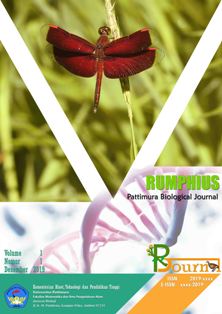THE EFFECT OF PROBLEM BASED LEARNING AND INQUIRY LEARNING LEARNING MODELS ON ECOSYSTEM CONCEP TO IMPROVE CRITICAL THINKING, AND CREATIVE THINKING, ABILITY OF STUDENTS SMA NEGERI 11 AMBON, SMA NEGERI 13 AMBON AND MADRASAH ALIYAH NEGERI AMBON.
Abstract
Many abilities that students must have, namely the ability to think critically, think creatively, construct knowledge, solve problems and master learning material well. One of the efforts to improve students' critical thinking and creative thinking skills is to change the old learning model used with the problem-based learning model and inquiry learning model. Students think more critically and think creatively and encourage students to be able to connect between the knowledge they have and its application in their daily lives. This study aims to determine the effect of two learning models, namely problem-based learning and inquiry learning to improve critical thinking skills and creative thinking on ecosystem material in class X SMAN 11, SMAN 13, and Madrasah Aliyah. The type of research is Quasi Experiment using 3 experimental classes using the problem based learning model and 3 experimental classes using the inquiry learning model. The statistical analysis used was multiple linear regression using SPSS 22. The results obtained from multiple linear regression analysis both had significant values <0.05 using both problem based learning and inquiry learning models at SMA N 11, SMA N 13 and Madrasah Aliyah Negeri Ambon. Conclusion. There is an influence of the use of problem-based learning models and inquiry learning models to improve the ability to think in class X SMAN 11, SMAN 13 and Ambon Madrasah Aliyah.
Downloads
References
Abidin, Y. 2018. Learning System Design in the Context of the 2013 Curriculum. Bandung: PT Refika Aditama.
Arnyana, I. B. P. 2006. The effect of applying innovative learning strategies in biology lessons on high school students' creative thinking abilities. Journal of Education and Teaching IKIP Negeri Singaraja, 3(6).
Hamruni. 2012. Learning Strategies. Yogyakarta. Madani people.
Khoiron, A.M., Sutadji, E. 2016. Contribution of the Implementation of Character Education and the School Environment on Creative Thinking and Its Impact on Vocational Competence. Journal of Education and Learning .22 (2): 103-116.
Fakhrizal, T., & Hasanah. U. 2020. Efforts to improve students' critical thinking skills in biology subjects through the application of project based learning learning models in class X SMA Negeri 1 Kluet Jawa Tengah. Journal of Biotics. 8 (2): 200-2017.
Fatmawati, B. 2013. Assessing students' science process skills through direct observation learning methods. Proceedings of the Biology Education Conference. 10 (1). Biology Study Program–STKIP Hamzanwari. Selong.
Hamidah, I., & Citra, Y. S. 2021. The effectiveness of the project based learning (pjbl) learning model on student interests and learning outcomes. Journal of Biology and Science Education. 4 (2): 20-27.
Jagatara, W.M.I., Adnyana, B.P., Widiyanti, M.P.L.N. 2014. Influence project-based learning model (project based earning) on biology learning outcomes in terms of learning styles of high school students. Science Study Program. 4 (2): 3540.
Murni, E. 2016. Application of the project based learning method in learning. Indonesian Christian University.
Norhasanah. 2018. Critical thinking ability of high school students in learning biology. Journal of Biology Learning. 5 (1): 23-29.
Palennari, M. 2016. The influence of problem based learning and cooperative jigsaw integration learning on critical thinking skills. Journal of Educational Sciences (JIP) State University of Malang. 22 (1): 32-29.
Prasetyo, E., Widyawati, S., Masyikur, R., Putra, G. F. 2018. The effect of picture and picture learning (pap) on mathematics learning outcomes in terms of spatial intelligence. Beta Journal of Tadris Mathematics.11 (1): 50-61.
Riyadi, S. A. 2019. Implementation of the project based learning model in biology learning on communicative, collaborative, critical thinking, and creative skills of high school students. Science Education Study Program. Indonesia.
Rosyida, F., Zubaidah, S., Mahanal, S. 2016. Empowering critical thinking skills with the remap tmps (reading concept map timed pair share) learning model. Proceedings of Biology Education Conference. 13 (1): 209-214. XIII National Seminar on Biology Education FKIP State University of Malang.
Sainab. 2022. The effect of picture and picture learning models on learning motivation and biology retention of Students Class X at SMA Negeri 2 Majene. Oryza Journal of Biology Education. 11 (1):12-19.
Santiawati, S. 2021. Integration of jigsaw type inquiry and cooperative learning models for increasing student understanding and participation. Pedagogia Scientific Journal of Education. 13 (1): 23-28.
Sukmawijaya, Y., Suhendar., Juhanda, A. 2019. The effect of the steam-pjbl learning model on students' creative thinking ability in environmental pollution material. Journal of BioEdUIN. 9 (2):12-19.
Susantini E. 2021. Biology learning ideas that can train higher order thinking skills (HOTs). Proceedings (National Seminar on Biology and Science Education). Department of Biology. Surabaya
Authors who propose a manuscript and have it approved for publication know that the manuscript will be registered and become part of the RPBJ. Authors and readers understand that this journal is open and all its contents can be accessed freely, provided that RPBJ is still listed as the source of information. The hope is that this journal can become a vehicle for exchange and scientific knowledge for society and the scientific community, especially in the field of Biology and other branches of science.









